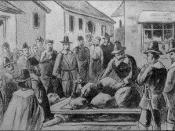Arthur Miller's play, "The Crucible," is a great example of people and their struggle with peer pressure. The play takes place in the town of Salem, Massachusetts, a small puritan community based on a very harsh system of truthfulness. When Reverend Parris discovers some of the girls dancing in the forest around a cauldron, he suspects something is going on. Rumors start to go around town speaking of witchcraft. These witchcraft rumors finally create the ultimate black cloud over Salem, affecting everyone beneath it.
After the girls are caught dancing in the woods, the rumors of witchcraft are starting to boil over in the town. The Reverend just wants to help the girls. But in order to help them, they have to confess to witchery. Without a second thought Abigail Williams confesses to being a witch, knowing she is not. Not only does she confess, but she makes the other girls involved confess also.
When the other girls saw that Abigail was not being punished for her acts, they decided to follow the leader. One by one the other girls follow her, committing a sad act of peer pressure. But in order to be saved they have to tell the Reverend everyone in the town that was a witch. The result was a whole list of people, who were not witches, being falsely accused. Throughout the play the girls' actions sentence innocent people to die, just so they can save themselves.
John Proctor, a well-respected man in the village, is accused of witchery. He is sentenced to hanging if he does not confess to witchery. He feels he would rather be hung, than dirty his name. He is asked to sign a piece of paper confessing to be a witch in order to save his life. But instead he...


